National Environment Management Authority (NEMA) has today, issued a certificate of approval to Total East Africa Midstream B.V, for the Environment and Social Impact Assessment (ESIA) of East African Crude Oil Pipeline (EACOP) Project.
The EACOP is a 1,443km crude oil export infrastructure that will transport Uganda’s crude oil from Kabaale – Hoima in Uganda to the Chongoleani peninsula near Tanga in Tanzania.
This major export system, (296km in Uganda and 1,147km in Tanzania), comprises a 24-inch insulated buried pipeline, 6 Pumping stations (2 in Uganda and 4 in Tanzania) and a marine export terminal.
This certificate of approval is specific to the Ugandan section of the project. Approval for the Tanzanian section was issued on November 29, 2019.
ESIAs are undertaken to define and evaluate the potential social, heath, human rights and environmental impacts of a project; and subsequently avoid these impacts where possible or identify adequate measures to mitigate the potential negative impacts on the environment and society as well as maximize and enhance the projects benefits.
The ESIA studies for the EACOP were conducted between 2017 and 2018 and covered extensive physical, biological and social baselines as well as stakeholder engagements.
As required by the National Environment Act and in fulfilment of the Environmental Impact Assessment (EIA) regulations, the first EACOP project report was submitted to NEMA for review on January 15, 2019.
NEMA then undertook comprehensive review of the ESIA report. The review initially included the consultation/engagement with 20 Lead Agencies including; Petroleum Authority of Uganda (PAU), National Forestry Authority (NFA), Uganda Wildlife Authority (UWA), Directorate of Water Resources Management (DWRM), Uganda National Roads Authority UNRA, MLHUD, Ministry of Gender Labour and Social Development (MGLSD), Ministry of Waster and Environment (MWE), Petroleum Exploration and Production Department (PEDPD), the Petroleum Midstream Department in MEMD; the local governments of Hoima, Kikuube, Kakumiro, Kyankwanzi, Mubende, Gomba, Sembabule, Lwengo, Rakai and Kyotera.
The public, including persons specifically affected by the project, were consulted on the EACOP project through a public disclosure regime – which included provision of written information on the project and ESIA (in English and various local languages from the project area of influence); radio and television announcements and talk shows; and Stakeholder engagement meetings in the 10 pipeline districts at selected sub-counties.
The ESIA public disclosure was followed by public hearings organized by the Petroleum Authority of Uganda (PAU) in partnership with NEMA on October 21, 23 and 25; 2019, in the districts of Kakumiro, Mubende and Rakai.
Having captured all the key issues that arose during the review process the National Environment Management Authority communicated these to the developer of the EACOP project (Total East Africa Midstream – BV) to address those issues in the ESIA report.
Having addressed the issues, the developer submitted the final Environment Impact Assessment Report to NEMA on August 7, 2020.
NEMA has reviewed the resubmitted ESIA and now issued the Certificate of Approval of the Environmental and Social Impact Statement for the EACOP Project.
The East African Crude Oil Pipeline will unlock East Africa’s Potential by attracting investors to explore opportunities in the region. The Project will yield substantial Foreign Direct Investment in Uganda and Tanzania during the construction phase.





